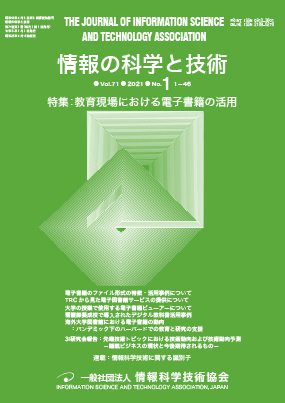
- |<
- <
- 1
- >
- >|
-
Tongjin LEE2021 Volume 71 Issue 9 Pages 385
Published: September 01, 2021
Released on J-STAGE: September 01, 2021
JOURNAL FREE ACCESS -
Yutaka MASUDA2021 Volume 71 Issue 9 Pages 386-391
Published: September 01, 2021
Released on J-STAGE: September 01, 2021
JOURNAL OPEN ACCESSThis paper illustrates the recent trends of academic publishers, who are responsible for disseminating trusted research results in scholarly communication, by watching the activities of the International Association of STM Publishers, which has a strong presence in the scholarly publishing industry. “STM Trends” published annually by the association, will be taken up as material for an overview of the current situation, and initiatives such as SeamlessAccess, GetFTR, and AI will be outlined.
View full abstractDownload PDF (4661K) -
Liz FERGUSON, Ben TOWNSEND2021 Volume 71 Issue 9 Pages 392-397
Published: September 01, 2021
Released on J-STAGE: September 01, 2021
JOURNAL OPEN ACCESSOpen access (OA) now accounts for approximately 30% of all publishing output, growing much faster than the entire STM publishing industry. This growth has been driven by OA policy developments, especially in Europe. The most impactful policy development of recent years was the creation of cOAlition S, whose policies are often controversial. Wiley and other publishers are responding to demands for increasing open access typically by launching new OA journals and flipping existing journals to full OA. The mechanisms and the impact of transitional agreements (TA), which have grown remarkably in recent years, are explored through examples such as the Wiley agreement with Projekt DEAL in Germany.
View full abstractDownload PDF (680K) -
Shoji TAKAHASHI2021 Volume 71 Issue 9 Pages 398-403
Published: September 01, 2021
Released on J-STAGE: September 01, 2021
JOURNAL OPEN ACCESSElsevier is the largest academic publisher with a history of more than 140 years but has recently strengthened its position as an information analytics business. This change was set in motion when Elsevier launched Scopus, a curated abstract and citation database, in 2004. Scopus was initially designed as a literature search tool for researchers and librarians but, with the implementation of high-quality author and affiliation profiles, it started to be used for research performance analysis. This paper describes how Elsevier developed its analytics products and technologies such as SciVal since then, how it expanded its user base to research evaluators, and how it can contribute to digital transformation in research support.
View full abstractDownload PDF (1361K) -
Liz ALLEN2021 Volume 71 Issue 9 Pages 404-407
Published: September 01, 2021
Released on J-STAGE: September 01, 2021
JOURNAL OPEN ACCESSThe academic publishing system is undergoing transformation. Against a backdrop of policy requirements for research to made open access (OA) and the increasing demand for research to be rapidly discoverable and accessible and usable forms and formats, most academic journals are moving to provide digital solutions. Many publishers, like F1000, are working hard to take publishing beyond the delivery of simple OA, developing publishing solutions that can democratize access to and use of knowledge. This article describes some of the causes and effects of the recent changes in the academic publishing system and considers likely future trends. Using the example of F1000, the article describes how closer working between publishers and other key stakeholders in the research system, notably research funders, can bring innovation and more tailored research publishing solutions that are key to maximising the potential for research to be use, reused, and have impact.
View full abstractDownload PDF (371K) -
Norimasa NOMURA2021 Volume 71 Issue 9 Pages 408-413
Published: September 01, 2021
Released on J-STAGE: September 01, 2021
JOURNAL OPEN ACCESS
J-STAGE DataPreprints have been gathering a growing interest, and various preprint services with diverse business models have started accepting preprints. This article analyzes the trend of preprints using a literature database and investigates the business models of preprint services by type of organizers. As a result of the analysis, the number of preprint submissions has been growing year by year, especially since 2016, and has been increasing rapidly. Running a preprint service requires a reasonable cost, and securing a sustainable operating base is an issue. For accepting the ever-increasing number of new submissions and provide a stable service to users, each preprint service requires a more stable operational base.
View full abstractDownload PDF (580K)
-
Kyoko HIDAKA2021 Volume 71 Issue 9 Pages 414-416
Published: September 01, 2021
Released on J-STAGE: September 01, 2021
JOURNAL OPEN ACCESSDownload PDF (390K)
-
2021 Volume 71 Issue 9 Pages 417-420
Published: September 01, 2021
Released on J-STAGE: September 01, 2021
JOURNAL FREE ACCESSDownload PDF (434K) -
2021 Volume 71 Issue 9 Pages k-1-k-8
Published: September 01, 2021
Released on J-STAGE: September 01, 2021
JOURNAL FREE ACCESSDownload PDF (6552K)
- |<
- <
- 1
- >
- >|